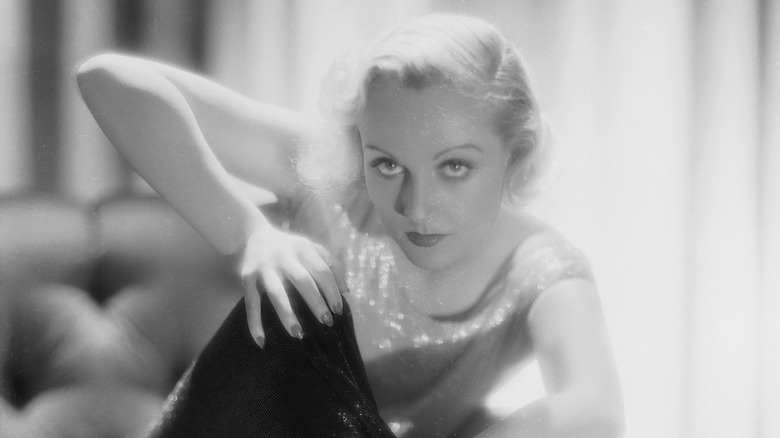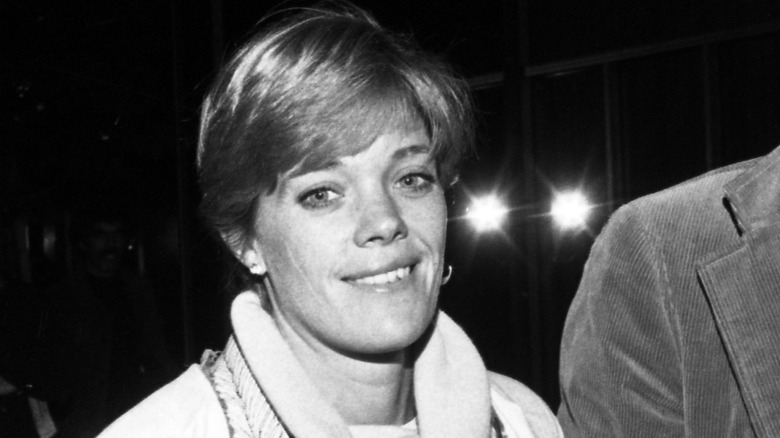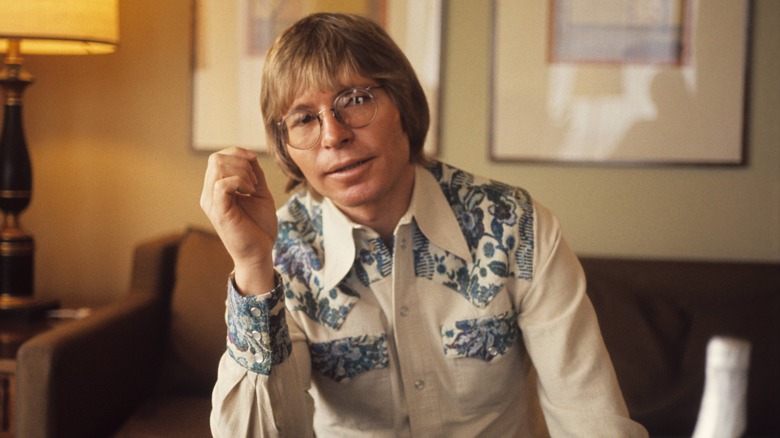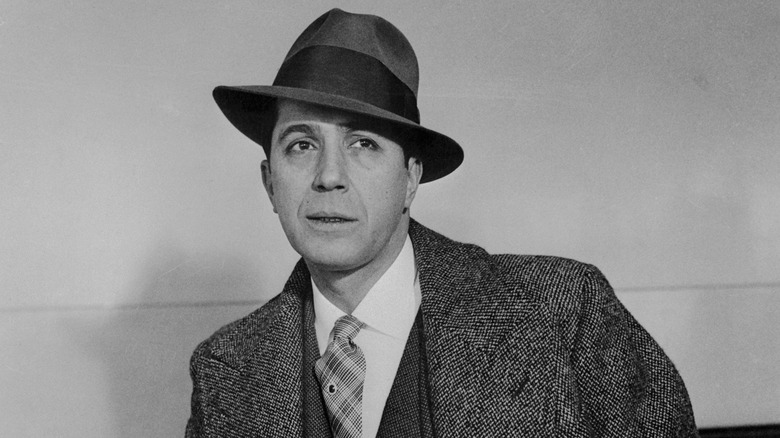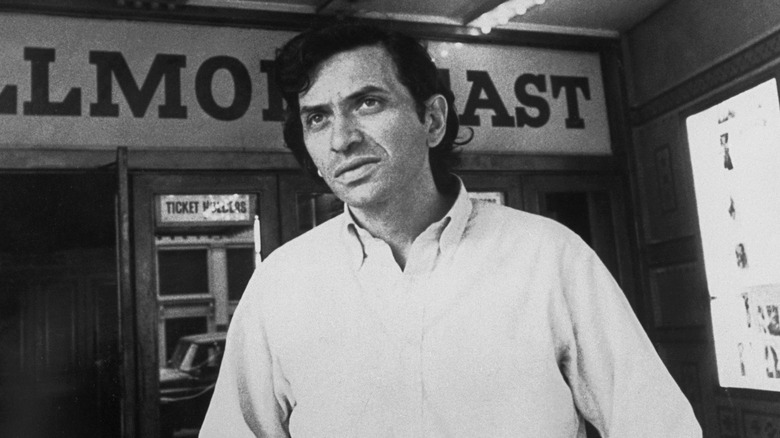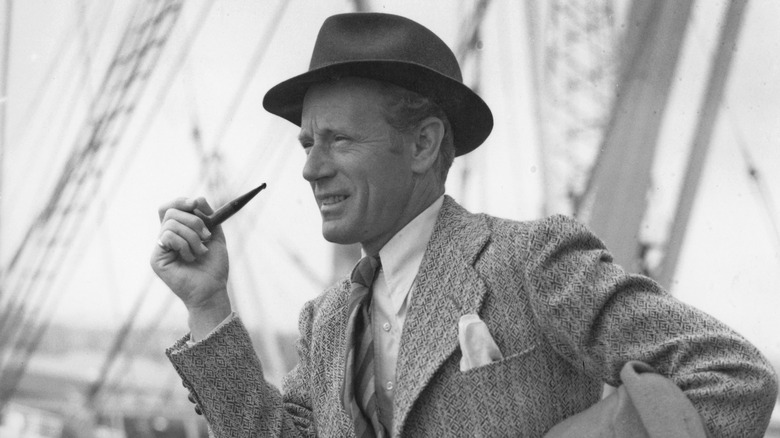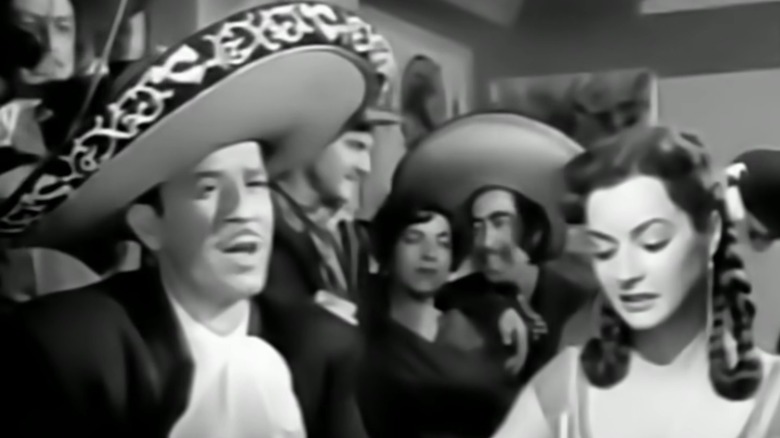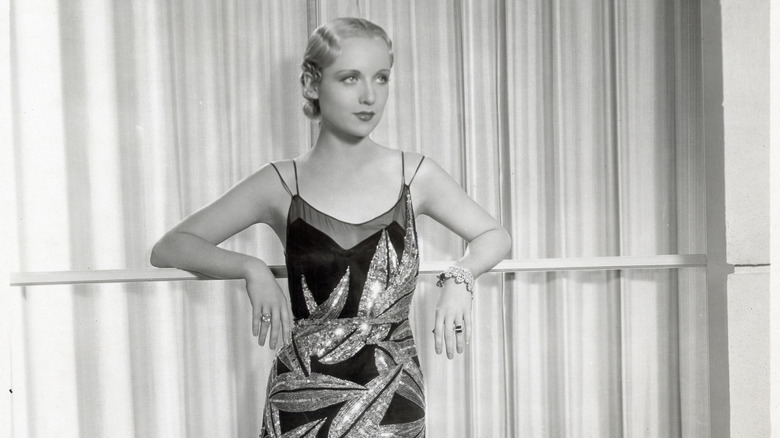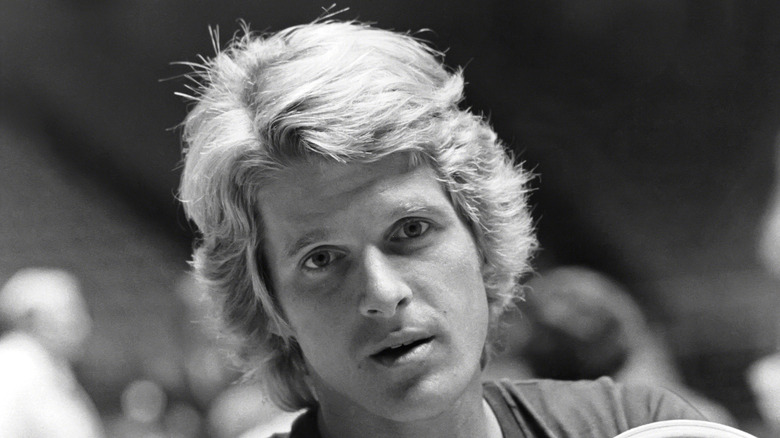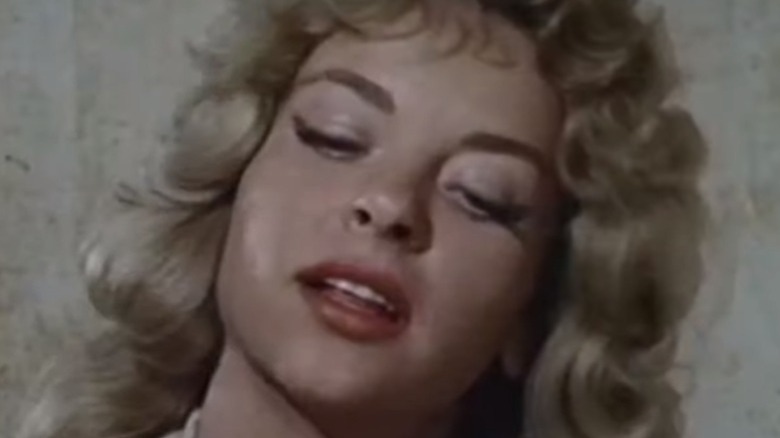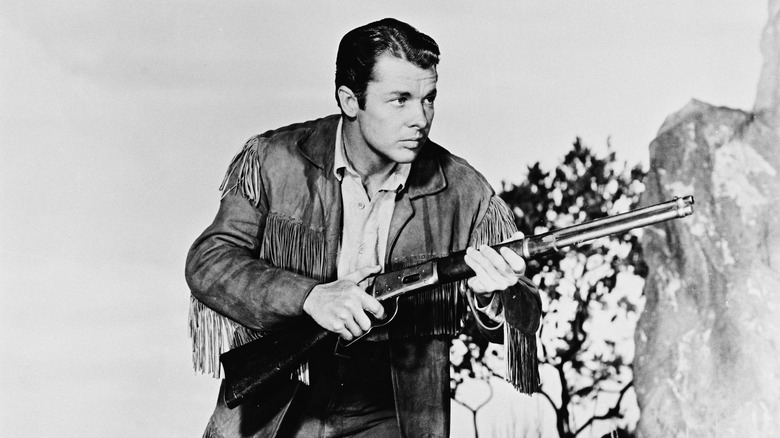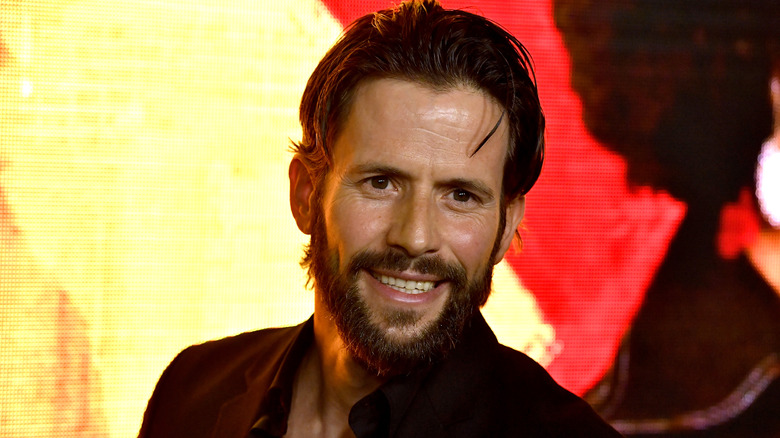Actors Tragically Killed In Plane Crashes
For those of us who are invested in pop culture, it can be terribly sad when those stars who have brightened our lives with their shine depart our earthly plane too soon. From actors to musicians to athletes, these are people whom we welcome into our homes just as readily as old friends; they tell us stories, sing us songs, and make us feel a little better about the world around us. Unfortunately, despite how it can sometimes appear, they are also mortal, and subject to the whims of fate just like the rest of us.
Of all the ways that we can check out unexpectedly, perhaps the most dramatic is to die in a plane crash; such events are exceedingly rare, and particularly when a movie star perishes in an aviation accident, it can seem quite literally like a star falling from the sky. Here are some of the most notable names in Hollywood who have met with that fate, leaving behind not only their loved ones and adoring fans, but also their legends.
Aaliyah
Aaliyah Dana Haughton, known professionally as simply Aaliyah, was destined to be a legend. Bursting onto the scene with her debut R&B album, the provocatively titled "Age Ain't Nothing But a Number" in 1994, she quickly became a concert-headlining, platinum-selling powerhouse; her somewhat questionable marriage to her mentor, the much older (and now thoroughly disgraced) singer R. Kelly only elevated her public profile further. Her 1996 sophomore LP "One in a Million" went double platinum — and this was all before she even graduated high school.
In 2000, being well on her way to conquering the music world, she decided to take on Hollywood, appearing in the 2000 feature "Romeo Must Die" with martial arts icon Jet Li and Isaiah Washington. She was next set to star in the Anne Rice adaptation "Queen of the Damned," and was enjoying the success of her self-titled 2001 LP, when tragedy struck. After completing a video shoot in the Bahamas in August 2001, the small plane that was to ferry her back to the U.S. crashed upon takeoff; all nine of those aboard, including 22-year-old Aaliyah, were killed. "Queen of the Damned" was released in February the following year, featuring what would unfortunately be Aaliyah's only star turn as an actor.
Berry Berenson
Berry Berenson followed a winding road to Hollywood. The daughter of a diplomat, she made her name as a fashion photographer, and through her actress sister Marisa, she became acquainted with a gaggle of film stars, many of whom posed for her camera. One of those was "Psycho" star Anthony Perkins, who was privately gay at a time when it was considered aberrant. In an attempt to "cure" himself, Perkins had been in therapy, and he had pointed out Berenson in a Vogue Magazine spread for his therapist as the type of woman that attracted him. The pair would meet by chance years later, and despite Perkins' sexual orientation, they married — and remained so for the rest of his life, having two children together.
Berenson dabbled in acting during her marriage to Perkins, appearing in the thriller "Remember My Name" with her husband and in the 1982 Paul Schrader film "Cat People," among others. Perkins died of AIDS in 1992, with Berenson by his side; her fate would, unfortunately, be no less dramatic. On September 11, 2001, 53-year-old Berenson was aboard American Airlines flight 11 when it was hijacked and flown into the World Trade Center. Memorializing her in a 2014 HuffPost column, her friend, actress and author Carole Mallory, called her, "the personification of unconditional love."
John Denver
The late, great John Denver was, of course, a musical icon. The owner of four No. 1 hits and an astonishing 11 platinum albums, many of his songs have become modern standards — tunes like "Rocky Mountain High," "Take Me Home, Country Roads," and "Annie's Song," one of the most plaintive and beautiful love songs ever penned.
Such is his legend in the world of music that it's easy to forget that, even had he had zero musical talent, he probably would have made his name as an actor. With his everyman good looks and amiable persona, he was at home on screens large and small; throughout the '70s, he appeared as a guest star in several TV series, popped up in a few made-for-television movies, and scored the lead in one feature film: 1977's smash hit "Oh, God!' opposite the immortal George Burns.
Although his recording career had declined, Denver continued to tour throughout the '80s and '90s, and appeared in one more feature, "Walking Thunder," in 1995. He was also an avid pilot of small aircraft, and it would be while indulging in this hobby that he met his end. On October 12, 1997, the singer lost control of the aircraft he was piloting while attempting to switch out gas tanks mid-flight; the craft crashed into California's Monterey Bay, and Denver, just 53 years old, was killed.
Carlos Gardel
Argentinian Carlos Gardel probably did more to popularize the tango than any other artist in history. As a recording artist, he recorded tunes like "Mi Noche Triste," which featured melodramatic, story-driven lyrics, whereas most tango compositions of the time were instrumental; as an actor, he appeared in early Argentine talkies such as 1931's "Las Luces de Buenos Aires," giving off an effortlessly cool, elegant vibe while often showcasing his singing talents. He is an icon who is adored in Argentina to this day — even though his life was cut tragically short nearly a century ago.
In 1935, while in the middle of a South American tour, Gardel's private plane went down in Colombia; everyone aboard perished, including his faithful musical collaborator Alfredo Le Pera. So beloved was Gardel that, after his death, his remains took a circuitous journey back to Argentina, which included stops in New York, Rio de Janeiro, and Montevideo, all of which drew thousands of mourners. Gardel's death came at the absolute peak of his fame; he was only 44 years old, and in Argentina, he is still a legendary figure.
Bill Graham
There are big-time concert promoters, and then there is Bill Graham, who was simply synonymous with rock and roll. From the beginning of his time in the music business in the mid-'60s, Graham thought big — big acts, big sets, big crowds. Anyone who has been to a rock concert has felt his influence; in a profile in The San Diego Union-Tribune, in 1990, Graham was referred to by a competitor as "the guy who started it all." Even a partial list of the biggest events he had a hand in promoting reads like a list of pop culture touchstones: the 1973 Watkins Glen concert, The Band's farewell concert captured in the Martin Scorsese concert film "The Last Waltz," the Moscow Peace Concert, and the Philadelphia edition of Live Aid.
Somehow, Graham also found time to dabble in acting, and fittingly, his short list of credits includes some iconic films. He appeared in the 1976 version of "A Star is Born," Oliver Stone's biopic "The Doors," and no fewer than three films for Francis Ford Coppola: "Apocalypse Now," "The Cotton Club," and "Gardens of Stone."
Graham's life was a big one, and the accident that claimed his life was dramatic; In 1991, he and his girlfriend Melissa Gold were aboard a helicopter that pilot Steve Kahn had been warned to keep grounded due to inclement weather. Kahn disregarded the warning, and shortly after takeoff, the craft crashed into a high-voltage tower, killing all aboard; Graham was 60 years old.
Leslie Howard
British actor Leslie Howard began his career on the stage during the silent film era, making his silver screen debut during the dawn of the talkies in 1930. His stage presence served him well in the early days of Hollywood; his acting and directing chops were such that he mounted his own production of "Hamlet," in which he also starred, and in his short film career, he made his mark in multiple classic films. He held down the lead role in the first film production of the George Bernard Shaw play "Pygmalion," starred in adaptations of "Of Human Bondage" and "Romeo and Juliet," and appeared in a key role in "Gone With the Wind."
At the advent of World War II, Howard went to work making Allied propaganda films — and improbably, he became the rare Hollywood actor to die a soldier's death. On June 1, 1943, Howard and 16 others were killed when their passenger plane, traveling to Bristol, England from Portugal, was shot down over the Bay of Biscay by Axis aircraft; the exact details of the incident are unknown, as the official record will remain sealed until 2043.
Pedro Infante
The great Mexican singer and actor Pedro Infante is a legend in his home country. He paid his dues in small nightclubs before his matinee-idol good looks landed him on the silver screen, which proved to be a boon to his recording career; as a recording artist, he notched over 300 songs, many of which appeared in his films. Known as the "King of Mexican Bolero" and the "Idol from Guamuchil," he was a staple on the big screen throughout the '40s and '50s, and won the award for Best Actor from the Mexican Academy for 1955's "La Vida No Vale Nada." Unfortunately, it was soon after that career peak that tragedy struck.
Infante was a pilot who owned his own private plane, a World War II-era C-87, which had been modified for his use. Infante had already survived two plane crashes, but was not so lucky on April 15, 1957, when he lost control of his craft shortly after takeoff from Merida en route to Mexico City. The plane went down, and Infante, the only one aboard, was killed; in Merida, there is still a memorial marking the exact spot where one of the most beloved screen idols in Mexican history lost his life.
Carole Lombard
Carole Lombard was one of the most talented actresses of her generation, and one of the first true superstars of the big screen. Beginning her career as a child actress, she was a success in the silent era, starring in over 20 pictures — and when the talkies arrived, she was one of a handful of actors who had no trouble with the transition, thanks to her sultry voice.
The star of countless screwball comedies of the '30s and an Academy Award nominee for 1936's "My Man Godfrey," the multi-talented actress was perhaps as well-known for her whirlwind, storybook romance with matinee idol Clark Gable, whom she married in 1939; her career was going full tilt when the U.S. entered World War II, and, like many actors, she helped out with a publicity tour to sell war bonds in 1942.
Most of the trip was completed by train, but fatefully, she chose to board a flight home at its conclusion, a DC-3 which was also ferrying Lombard's mother, MGM executive Otto Winkler, and a group of Army pilots from Las Vegas to Los Angeles. In part due to the fact that warning beacons had been disabled, over the fear of Japanese bombers appearing on the mainland (Pearl Harbor was, of course, fresh in everyone's memory), the plane strayed from its course — and plunged into a cliff on the side of Mount Potosi, about 30 miles outside of Vegas. A distraught Gable never fully recovered; although he married twice more, he was buried next to Lombard upon his death in 1960.
Dean Paul Martin
Dean Paul Martin was much more than just the son of the Rat Pack legend, Dean Martin; he was a man of many talents, beginning his time in the public eye as a tennis pro, even making an appearance in the qualifying rounds of Wimbledon in the late '70s. He parlayed this experience into a role in the 1979 feature film "Players," opposite Ali McGraw, and more roles followed, both on television and on the big screen; he guested on series like "The Love Boat" and "The Hitchhiker," and popped up in films, including the acclaimed 1983 drama "Heart Like a Wheel." His true passion, though, was flying — he earned his pilot's license while still a teenager, and after a stint in the California Air National Guard, he embarked upon officer's training for the U.S. Air Force, which he completed in 1981.
By 1987, Martin was an Air Force Captain flying fighter planes, and it was during a routine training exercise that he met with a tragic fate. In March of that year, Martin and his weapons systems officer took off from March Air Force Base (now an Air Reserve Base) in a snowstorm, flanked by two additional aircraft; with visibility low, the craft were instructed to change course in order to avoid the towering peak of San Gorgonio mountain. Martin, unfortunately, failed to make the proper adjustments, and his craft slammed into the peak, killing him and his fellow officer instantly.
Eve Meyer
Exploitation filmmaker Russ Meyer is responsible for a slew of low-budget '60s and '70s flicks with titles like "Skyscrapers and Brassieres," "Mondo Topless," and "Supervixens," which may give you an idea as to his proclivities. For much of this time, his partner in crime — both onscreen and off — was his wife Eve Meyer, a former pin-up model and Playboy Playmate whom he married in 1952. Eve appeared in a goodly number of Meyer's films, and worked as an associate producer on several, including the exploitation classics "Faster, Pussycat! Kill! Kill!" and "Beyond the Valley of the Dolls," the latter of which holds the distinction of being the only film to be co-written, with Russ Meyer, by legendary film critic Roger Ebert.
In 1977, at the age of 48, Eve Meyer became a casualty in one of the deadliest events in aviation history: the Tenerife airport disaster, which took place on the tiny island of Tenerife in the Canary Islands. Two passenger planes, both of which had been diverted from a larger airport due to a terrorist attack earlier in the day, were taxiing in preparation for takeoff when they collided with each other and burst into flames; nearly 600 people lost their lives.
Audie Murphy
Audie Murphy never intended to be an actor; he might never have had a life in the public eye if not for his courage on the World War II battlefield. Murphy was credited with hundreds of confirmed kills and acts of bravery, receiving the Congressional Medal of Honor in 1945; he was wounded three times in battle, and came to exemplify American bravery in the eyes of the public. Thrust into life as a public figure, Murphy decided to try his hand in Hollywood, taking on several small roles before breaking through in classics such as "The Red Badge of Courage" (1951) and the film adaptation of his memoir, "To Hell and Back."
By the '70s, Murphy was in dire financial straits; the film roles had largely dried up, and he had filed for bankruptcy in 1968. In May 1971, he and four companions chartered a private plane to Martinsburg, Virginia, with the intention of scouting out a manufacturer of modular housing in which Murphy hoped to invest. They never reached their destination; due to unknown factors, the small craft crashed into the wooded side of the mountain outside of Roanoke, killing all six aboard. Murphy earned himself a star on the Hollywood Walk of Fame, but those who knew him preferred that he not be remembered for his acting. Leaving his memorial service, his ex-wife Hendrix summed him up succinctly: "He was a great soldier," she said. "No one can ever take that away from him" (via the Los Angeles Times).
Christian Oliver
Veteran character actor Christian Oliver carved out a career for himself that spanned nearly three decades, making his debut in the 1994 spin-off "Saved By the Bell: The New Class." The German-born actor amassed a huge body of television and video game credits; he did not often venture into feature films, but when he did, he tended to make it count. Among his credits are the 2006 Steven Soderbergh drama "The Good German," in which he starred alongside the likes of George Clooney and Cate Blanchett; and "Speed Racer," the 2008 adaptation that, despite its mixed reception, stands as one of the most ambitious and singular works in the filmography of the Wachowskis.
On January 4, 2024, Oliver was aboard a small aircraft, flying to the island of St. Lucia with his two young daughters, when the single-engine plane experienced serious mechanical issues, crashing into the ocean shortly after takeoff. Oliver had been on vacation after completing his latest film, "Forever Hold Your Peace," which he had also co-produced; the film's director Nick Lyon, speaking with The New York Times, lamented the fact that Oliver would not see it released. "It was a big project for us," he said. "We had talked about it for years." Oliver was only 51 years old.
